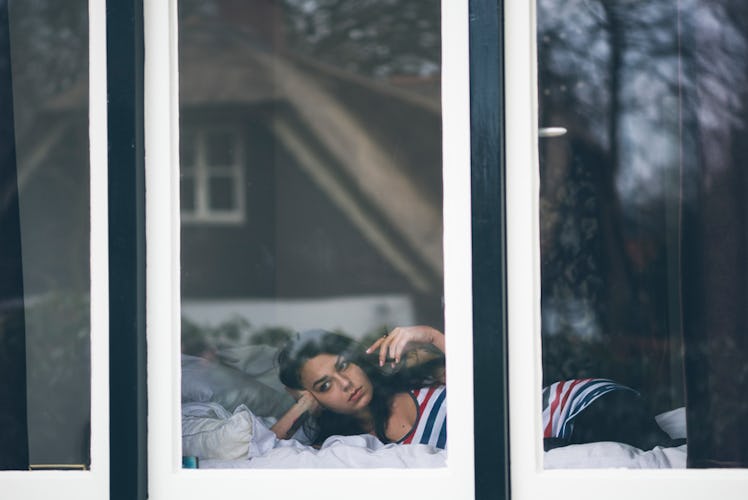
The Winter Solstice May Not Affect Your Period, But This Is What Definitely Will
In case you haven’t noticed, menstrual cycles often have a mind of their own. They flow based on the unique state of a woman’s body, and can be altered by behavior changes like diet and exercise, as well as physical and mental struggles like illness and stress. Personally, I think our periods entirely depend on the individual female body, but it’s fun to explore whether or not nature plays a hand in our cycles. For instance, Dec. 21 is the shortest day and longest night of the year; will the winter solstice affect your period during this time?
Unless you’ve been diligently tracking how your body feels throughout each cycle, and noting the state of the solar system on those specific dates simultaneously, it’s (really) hard to say for sure that your period is taking social cues from space. However, there are some theories to consider here.
Dr. Akua Gray, author of Holistic Sexuality: A Practical Guide to Sexual Healing, for example, wrote in a blog post that women whose menstrual cycles take place during the summer or winter solstices supposedly experience mental clarity and become more in tune with their emotions and goals. While I’m sure that some aspects of this are true, seeing as how during my own period, I feel hyper-aware of my body and what it needs/wants, I'm not convinced this is necessarily because of the winter solstice alone.
While the winter solstice might not affect your period, the winter season definitely could.
I'll admit that it would be pretty awesome if menstruation followed along with the lunar phases, or reacted to the position of the sun in relation to the Earth. But alas, our bodies are just that — ours. Which means our periods respond to the state of our physical and mental health, not the solar system. They do, however, change with the winter season when our behaviors start to reflect the dropping temperatures and lack of sunshine.
According to Bootsy ChuChu founder Siena Dixon, mood, metabolism, and menstruation are all impacted by the change of seasons, and you can tell based on little changes in your cycle, as well as the symptoms you may or may not endure in comparison to other months. The most telling, she explains, is how long your period drags on.
"Sunshine helps the body increase its secretion of ‘follicle stimulating hormone’ (FHS), a hormone that helps to regulate the reproductive processes of the body," Dixon tells Elite Daily. "As a result, in winter, you may ovulate less frequently, and experience a longer menstrual cycle compared to summer." In other words, less sun, more bleeding — isn't that lovely? Cue eye roll.
Temperatures outside your body can also affect what's happening inside your body.
As if having to venture out into the frigid cold weather every morning wasn't enough of a struggle on its own, those drastic changes in temperature can sabotage your menstrual cycle, too. This is true for summer and winter, when we start to notice either very high or below-freezing measurements scattered across our extended forecast. This, Dixon says, is because a) our metabolic rate mirrors outside temperatures and b) the cold constricts our blood vessels which, as a result, can "increase period pain and alter menstrual blood flow." Am I the only one incredibly pissed off about this, but also low-key intrigued by this information?
And, naturally, on top of freezing temperatures and limited hours of sunshine messing with your cycle, shifts in behavior will also reflect via your flow. Think about how much you're exercising, the foods you're eating, and if the holiday season for you means celebrating with a lot of wine. According to Dixon, these seemingly harmless behavioral changes can actually do major damage on your cycle by worsening PMS symptoms like "bloating, menstrual acne, breast pain, moodiness, and headaches."
If you do have your period during the winter solstice, I'd definitely advise taking advantage of the shortened day ahead.
I'm being totally serious when I say this: If you happen to have your period on the day of the winter solstice, milk that sh*t. The shortest day and longest night of the year is an annual offer you'd be silly not to take advantage of.
The second you get home from work or school, slither into something comfy, claim your spot on the couch, and do not move from said spot until it's actually time to go to bed. Watch your favorite rom-coms on Netflix, make a huge bowl of popcorn, take a few bites of chocolate, and chill. Trust me, you deserve it, and so does your body.